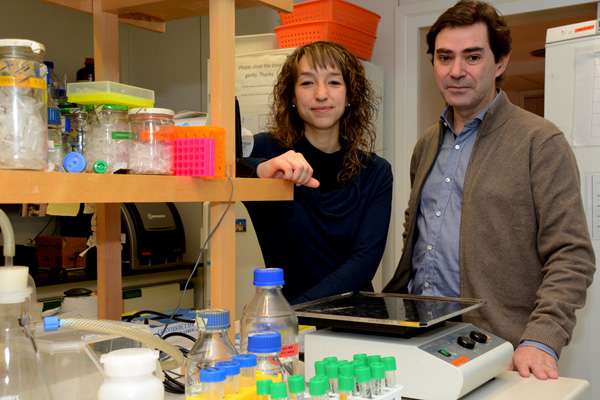Huntington’s Disease Neurons May Be Defective from Early Life, Researchers Find
Written by |

University of Barcelona researchers Mónica Pardo and Josep M. Canals participate in a study that opens a new door to the development of therapies for the first stages of the appearance of the Huntington disease’s symptoms. (Photo credit: UB)
Although symptoms of Huntington’s disease don’t appear until later in life, new research suggests that the genetic flaw may alter neurons during early development — findings that may change ideas on how to treat the illness.
For the study, “Developmental alterations in Huntington’s disease neural cells and pharmacological rescue in cells and mice,” researchers with the HD iPSC Consortium analyzed the gene activity of patient-derived induced pluripotent stem cells, and found that one-third of the altered genes are crucial for nerve cell development. Their work appeared in the journal Nature Neuroscience.
“Despite being a genetic disease, it was thus far thought that the development of the nervous system of the patients was correct until the patient ages and some symptoms … start coming up,” Josep M. Canals, a researcher at Spain’s University of Barcelona Institute of Neurosciences, said in a press release.
Huntington’s, an irreversible neurogenetic hereditary disease, afflicts only five to seven out of 100,000 people in Western countries. To study how nerve cells are affected by a mutated huntingtin gene, the team analyzed gene expression in the striatum of the brain in animal models of the disease. The striatum holds the dopamine-producing cells that degenerate in Huntington’s.
Then the team looked at corresponding data from patient-derived neurons, grown from induced stem cells. Such cells are transformed “backward” from patients’ skin cells to create stem cells, which in turn can be grown into neurons or other cells that interest researchers.
“Our details show that there are subtle signs of alterations in the development of the neurons of these patients, which are not the same as normal neurons,” said Canals, explaining that the abnormal gene expression allowed researchers to home in on several disrupted molecular pathways. These pathways can be modulated with the compound ISX-9.
When the team treated the lab-grown, patient-derived cells with the drug, the symptoms derived from the gene defects improved. Huntington’s mice also reacted to the treatment, showing less cognitive impairment and neuronal abnormalities.
The research team suggested that the findings support the idea of treating Huntington’s in early life. “Instead of waiting for the symptoms to come up, maybe we should act on malfunctioning neurons before,” Canals said.





